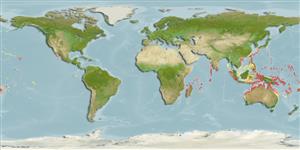Teleostei (teleosts) >
Ophidiiformes (Cusk eels) >
Dinematichthyidae (Viviparous brotula)
Etymology: Diancistrus: Greek, di = two + Greek, agkistron = hook (Ref. 45335); alleni: Named for Gerald R. Allen, Perth, Western Australia.
Eponymy: Dr Gerald Robert ‘Gerry’ Allen (d: 1942) is an American-born Australian ichthyologist. [...] (Ref. 128868), visit book page.
More on authors: Schwarzhans, Møller & Nielsen.
Environment: milieu / climate zone / depth range / distribution range
Ecology
Marine; reef-associated; depth range 5 - 17 m (Ref. 57884). Tropical
Indo-West Pacific: Chagos and Maldives to Java, Australia, New Guinea, the Solomons, Vanuatu, and Samoa.
Size / Weight / Age
Maturity: Lm ? range ? - ? cm
Max length : 7.0 cm SL male/unsexed; (Ref. 57884)
Short description
Identification keys | Morphology | Morphometrics
Dorsal soft rays (total): 75 - 84; Anal soft rays: 60 - 70; Vertebrae: 43 - 45. Diagnosis. Vertebrae 11+32-34=43-45, dorsal fin rays 75-84, anal fin rays 60-70; outer pseudoclasper hook-shaped, hook-like extension bent outwards, with massive supporter; inner pseudoclasper anteriorly connected to outer pseudoclasper, stout, fleshy; 1 or 2, rarely 3 large scales on operculum above opercular spine aligned in single row and usually covered by mucus and skin (Ref. 57884).
Solitary inhabitant of coral reef crevices, cryptic (Ref 90102).
Life cycle and mating behavior
Maturity | Reproduction | Spawning | Eggs | Fecundity | Larvae
Schwarzhans, W., P.R. Møller and J.G. Nielsen, 2005. Review of the Dinematichthyini (Teleostei, Bythitidae) of the Indo-West-Pacific. Part I. Diancistrus and two new genera with 26 new species. The Beagle, Records of the Museum and Art Galleries of the Northern Territory 21:73-163. (Ref. 57884)
IUCN Red List Status (Ref. 130435: Version 2024-1)
Threat to humans
Harmless
Human uses
Fisheries: of no interest
Tools
Special reports
Download XML
Internet sources
Estimates based on models
Preferred temperature (Ref.
123201): 25 - 29.3, mean 28.3 °C (based on 1927 cells).
Phylogenetic diversity index (Ref.
82804): PD
50 = 0.5000 [Uniqueness, from 0.5 = low to 2.0 = high].
Bayesian length-weight: a=0.00389 (0.00180 - 0.00842), b=3.12 (2.94 - 3.30), in cm total length, based on all LWR estimates for this body shape (Ref.
93245).
Trophic level (Ref.
69278): 3.3 ±0.5 se; based on size and trophs of closest relatives
Fishing Vulnerability (Ref.
59153): Low vulnerability (10 of 100).
